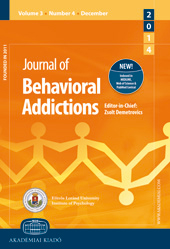Do I Feel Ill Because I Crave for Work or Do I Crave for Work Because I Feel Ill? A Longitudinal Analysis of Work Craving, Self-Regulation, and Health
Do I Feel Ill Because I Crave for Work or Do I Crave for Work Because I Feel Ill? A Longitudinal Analysis of Work Craving, Self-Regulation, and Health
Author(s): Kamila Wojdyło, Wilhelm Karlsson, Nicola BaumannSubject(s): Individual Psychology, Cognitive Psychology, Psychology of Self, Substance abuse and addiction, Health and medicine and law, Human Resources in Economy
Published by: Akadémiai Kiadó
Keywords: work craving; workaholism; work addiction; action orientation; health;
Summary/Abstract: The theory of work craving defines workaholism as a pathological work addiction which comprises: (a) obsessive–compulsive desire to work, (b) anticipation of self-worth compensatory incentives from working, (c) anticipation of reduction of negative emotions or withdrawal symptoms from working, and (d) neurotic perfectionism. Research has shown that workaholism is associated with adverse health outcomes. However, the antecedents of workaholism and the causal direction of the relationship with health have been largely neglected. Aims: In the present longitudinal study, we expect that work craving is predicted by deficits in emotional selfregulation (i.e., low action orientation) and mediates the relationship between self-regulation deficits and symptoms of psychological distress. We expected work craving to have an effect on later psychological distress symptoms, but not psychological distress symptoms to have an effect on later work craving. Methods: In a sample of 170 German employees, a half-longitudinal design using two times of measurement was implemented to specify the paths of two different structural equation models of mediation: (a) action orientation to later work craving and work craving to later psychological distress, and alternatively, (b) the temporal order of action orientation to later distress and distress to later work craving. Results: Our data indicated that work craving partially mediated the relationship between selfregulation deficits and psychological distress, but psychological distress symptoms were not found to increase later work craving. Conclusions: The presented longitudinal study indicates important mechanisms of work craving, especially by highlighting the influence of self-regulation deficits on work craving and, in turn, psychological distress.
Journal: Journal of Behavioral Addictions
- Issue Year: 5/2016
- Issue No: 1
- Page Range: 90-99
- Page Count: 10
- Language: English

